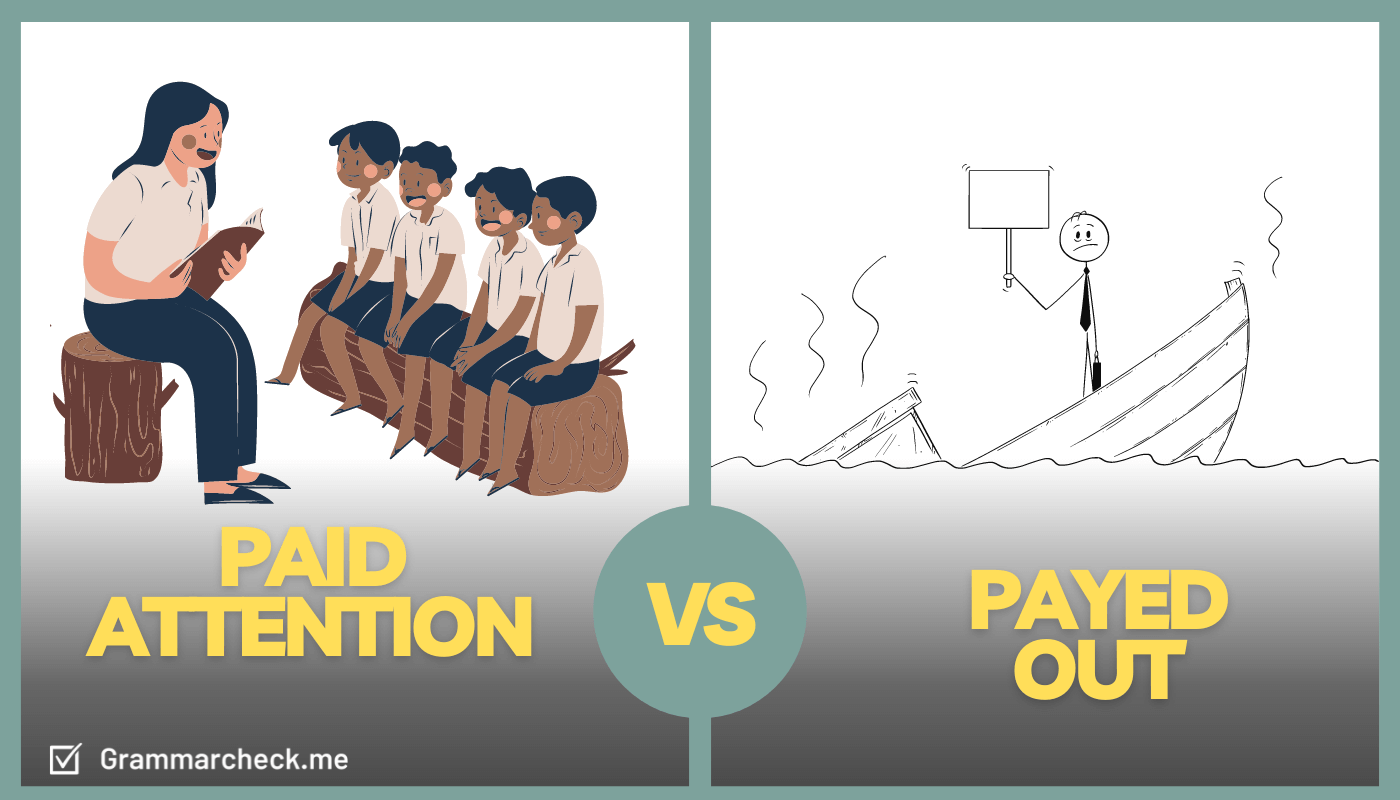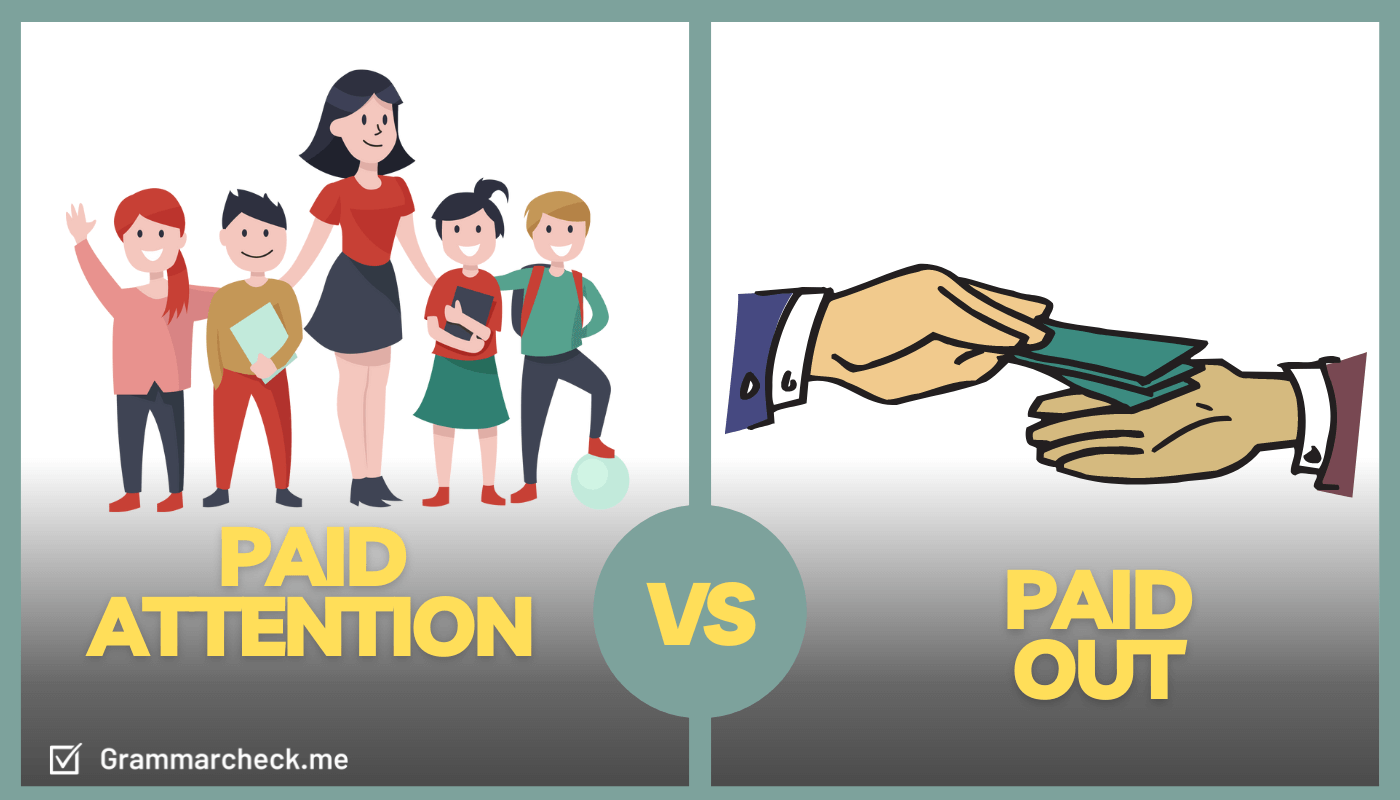The English language is full of words & phrases that can be easily confused. The difference between paid attention or payed attention is a prime example of this. It can be very difficult for new writers to understand the difference between paid & paid! In this post, we’ll explain how to use the past tense form of the phrase “pay attention” with example sentences to illustrate.
Which Is Correct: Paid Attention or Payed Attention?

Takeaway: The correct spelling is “paid attention”. It is never correct to use “payed attention” in your writing.
The phrase “paid attention” is used to indicate that you have focused, shown interest, or been engaged with something in the past. Paid is the simple past tense form of the verb pay. You can use the Chegg Grammar Checker to make sure you’re using “paid” correctly!
- Mark paid attention in class.
- Tom paid attention to his coach’s speech.
- Steve never paid attention once during history class.
The word payed is rarely used. It is a verb that is used to patch a leak in the past tense. It is the past tense form of the word pay.
Sentence Examples
Here are some examples of how to use the phrase “paid attention” in your writing.
- John paid attention to his teacher’s lecture on the verbs payed and paid.
- Steve failed his history exam because he had not paid attention during any of the lectures.
- If I had paid attention in class my GPA would have been significantly higher.
- My only regret is that I wish I had paid attention more during my calculus class.
- Martha never paid attention to her Mother’s advice & now shes headed down the wrong path in life.
Just like we saw in our post comparing the words lives and lifes, even small spelling mistakes can derail a otherwise great sentence!
How To Use Paid

The verb paid is most commonly used to indicate a transfer of money. When someone gets paid, they exchange money. It always important to edit your writing to avoid mixing up payed & paid!
- Mark finally paid his debt.
- My company paid me for my work.
- Steve’s client never paid for his latest project.
Paid can also be used as an adjective in certain situations. Most commonly, paid is used as an adjective to describe the type of day off people get at work.
- For example, “paid time off”.
How To Use Payed
Payed is a rare word that means to repair a boat. Just like the words stoaked & stoked, payed is almost never used in writing. More specifically, it means to patch or tar a damaged boat to fix a leak.
- Sailors payed the boat so that it wouldn’t sink!
Popularity Analysis
By analyzing Google’s N Gram data you can see that the verb “paid” is far more popular than the verb “payed”. This is because “payed” is an irregular verb that can only be used correctly in a few situations.
However, just like we saw in our analysis of the words Sergeant vs Sargent, the popularity of words can change. As the years go on there is no prediction if “paid” will become more or less popular amongst authors. Cultural changes can also change the vocabulary our authors use in their writing!
Paid Attention Synonym
Here are some synonyms for the phrasal verb “paid attention” that you can use in your writing.
- Focused – “I focused intently on my teacher’s last lecture.”
- Concentrated – “Steve always concentrated very hard in Chemistry class.”
- Attentive – “John was always very attentive during Math class.”
- Engaged – “The kids performed well on their exam because they were very engaged during the previous lectures.”
- Interested – “Mike has always been interested in learning about Biology.”
Paid Off vs Payed Off
The phrase “paid off” is the correct spelling. This phrase is most commonly used to indicate a debt has been paid.
- After 20 years, I finally got my mortgage paid off!
The phrase “payed off” is never correct. If you are trying to use the present tense use the phrase “pay off”.
- I know my hard work will pay off at some point.
Frequently Asked Questions
Payed attention is not correct grammar. The phrase “paid attention” is used as the past tense form of to pay attention. There are only a few rare cases where payed is the correct past participle form of the verb pay.
The correct form is to get paid. Paid is most commonly used to describe receiving money or some sort of financial transaction. Use the correct spelling paid when referring to transferring money.
You might say “I got an A on my test because I paid attention during all of the lectures.” Paid is used as a past tense and irregular verb version of the phrase to pay attention.
In a boating or nautical sense, the verb payed is used to show that leaks have been fixed. For example, “the sailor payed the crack in the boat hull to prevent further leaks.”
You could say “John is confident heading into his final exam because he paid attention during every lecture & studied extensively.”
Payed out is not the correct spelling. However, paid out means that someone transferred money in the past tense. For example, “I finally got paid out for my last project that was completed in June.”
Bottom Line
By now, you should be an expert on the phrases paid attention or payed attention! The word payed should never be used before attention. The correct past tense form of the verb “pay attention” is “paid attention”. So if you are trying to communicate that you were paying attention in the past tense, use the verb paid! If you need some extra help with this spelling rule, consider using our grammar english online check tool FREE of charge.
